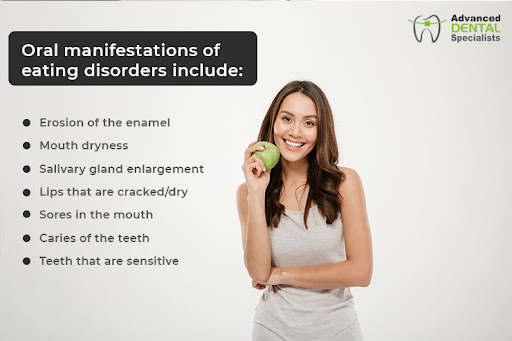How eating disorders can damage your mouth, and how your dental team can assist in detecting early warning indications
Eating disorders, such as anorexia, bulimia, and binge eating disorder, can have harmful consequences on the mouth; their symptoms can range from mild to severe, and dental practitioners are frequently among the first to spot potential warning signs.
Several studies have found that eating disorders can have an impact on oral health. That is why the Oral Health Foundation is participating in Eating Disorders Awareness Week.
In this blog post, we will look at the primary symptoms of each ailment, how they can influence your oral health, and how your dental team can assist you.
What exactly is anorexia?
People suffering from anorexia nervosa restrict their food and drink intake because they are afraid of gaining weight. Many anorexics base their self-worth on their calorie intake and punish themselves for eating too much or the “wrong types” of foods.
In addition to calorie restriction, some patients with anorexia will try to lose excess calories and weight by exercise, vomiting, taking laxatives or using enemas.
What exactly is bulimia?
Bulimia nervosa is a binge eating disorder that is diagnosed based on the sufferer’s binge-purge cycles. To meet the criteria for a bulimia diagnosis, you must binge (consuming an excessive quantity of calories in one sitting) and purge (expelling food/calories through extreme exercise, taking laxatives, or forcing yourself to vomit) on a frequent basis for an extended length of time.
Specific binge-purge patterns differ across individuals, but because many bulimics are regarded to be of normal weight, symptoms can often go undiagnosed. Bulimia patients may also experience fatigue, bloating and/or constipation, stomach pain, and irregular menstrual cycles.
What exactly is a binge eating disorder?
Binge eaters were traditionally labeled as food addicts, but we now have a better grasp of the disease. Binge eaters frequently consume huge amounts of food and/or drink without feeling in control of their actions. These binges might be planned ahead of time, with the sufferer purchasing “special” foods to binge on, or they can be spontaneous.
Binge eaters are not “overindulging” on meals or simply eating excessive portions; they are unpleasant experiences that frequently bring anguish and shame for sufferers.
A binge eating episode is defined as eating quicker than usual, eating until you are uncomfortably full, eating huge amounts of food when you are not hungry, eating alone due to embarrassment at the amount eaten, and feelings of disgust, shame, or guilt during/after the binge.
Those suffering from binge eating disorders, unlike those suffering from bulimia, will not purge after a binge.
How might eating disorders damage your oral health?
All of these eating disorders have a detrimental impact on the bodies of those who suffer from them and should be recognized as serious medical diseases.
Potentially harmful effects of vitamin and nutrient deficiencies might lead the body to shut down and fail to function properly, which will be reflected in the mouth. Oral manifestations of eating disorders include:
- Erosion of the enamel
- Mouth dryness
- Salivary gland enlargement
- Lips that are cracked/dry
- Sores in the mouth
- Caries of the teeth
- Teeth that are sensitive
- Bruising and/or damage to the mouth
How might the dental team assist in the detection of eating disorders?
Dentists, dental hygienists, therapists, and dental nurses are well-positioned to detect early indicators of eating disorders.
During your dental check-up, they examine the hard and soft tissues of your mouth for signs of tooth erosion and any mouth injuries caused by putting objects into your mouth to make yourself vomit.
In addition to detecting erosion caused by stomach acid, they will be able to detect tooth decay caused by excessive sugar consumption and indicators of nutrient inadequacies.
If they feel you have an eating issue, they will talk you through the clinical indicators they observe in your mouth and, if necessary, recommend a high fluoride toothpaste or varnish to prevent your teeth from decay.
Have you struggled with an eating disorder that has resulted in oral health issues? If this is the case, we’d want to hear from you. For more information, please visit https://adsorthodontics.com/appointment-request/ and help us give better oral healthcare to all.

